- Home
- Peter Matthiessen
Sal Si Puedes (Escape if You Can) Page 5
Sal Si Puedes (Escape if You Can) Read online
Page 5
From Chicanos to men and women of color. . . . The politics of language was actually more treacherous. A growing Latino middle class—what historian Rudolfo Acuña, in his book Occupied America, defined as “the brokers”—embraced ambivalence as its worldview. Its language got closer to Spanglish, and it began to see itself as the owner of a hyphenated identity, a life in between. The shift was perceived as a ticket toward assimilation. This middle class, eager to cross over, found itself courted by savvy politicians and by a merchandise-oriented society. Clearly the mainstream was ready to open its arms only if Chicanos were ready to define themselves elastically enough to become “Hispanics,” the rubric that predeceased “Latinos,” large enough to also encompass those hailing from Puerto Rico, Cuba, Ecuador, El Salvador . . .
But as time went by this polycephalous minority ceased to be acquainted with Cesar Chavez. It no longer recognized the leader’s struggles as its own. One comes to America dreaming of a better world, it was announced loud and clear, and in the process, one learns to consume and be consumed. I once heard a friend of Chavez say that Cesar had had “the fortunate misfortune” to have avoided martyrdom. Unlike Martin Luther King Jr. or Malcolm X, he had outlived himself, outlived his message. His exuberance and self-confidence were replaced by a strange silence. Rumors from within the UFW described him as sectarian. Those that had not stayed and fought were received with indifference; Matthiessen felt some of that reticence when he told Chavez that he was thinking of writing a sequel to Sal Si Puedes. Chavez’s response was ambiguous, even reluctant. The effort went nowhere. Perhaps we should feel fortunate that it didn’t, for the best of Chavez had already been recorded.
Survival, sacrifice. . . . When Chavez died in 1993, thousands gathered at his funeral. It was a clear sign of how beloved he was, how significant his life had been. President Bill Clinton spoke of him as “an authentic hero to millions of people throughout the world,” and described him as “an inspiring fighter.” And Jerry Brown called him a visionary who sought “a more cooperative society.” In the media Chavez was portrayed as “a national metaphor for justice, humanity, equality, and freedom.” Matthiessen himself wrote an obituary for the New Yorker. “A man so unswayed by money,” he wrote, “a man who (despite many death threats) refused to let his bodyguards go armed, and who offered his entire life to the service of others, [is] not to be judged by the same standards of some self-serving labor leader or politician. . . . Anger was a part of Chavez, for so was a transparent love for humankind.”
It is left to us, though, his successors, those that never had the privilege to meet him, especially the millions of Latinos moving slowly into the mainstream, to ponder his legacy. The rise of consumerism and the disenfranchisement of reformism might have pushed him to the fringes. At first sight his ethos in the field might have little to say to our middle-class angst, the one that colors the way we reflect on Hispanic history in the United States. But it is an outright mistake to let our class differences obliterate the bridges between us. It is true that toward the end of his sixty-five-year-long career, Cesar Chavez and America parted ways. Yet it is the leader valiant enough to redefine his roots, devoted to make America more elastic, that we must reread and thereafter reclaim, a dreamer that proved that wealth and a formal education aren’t everything, that humankind is not about getting ahead of everyone else but getting ahead together. Not Chavez the myth but Chavez the ordinary man, neither the name nor the face but the message—“Let’s enable common people to do uncommon things”—awaits attention. In the attempt to agglutinate us all under a single rubric, his Chicano self must be opened up to embrace all Americans, particularly all of those with diverse Hispanic backgrounds. For the fact that he was Mexican is significant but not confining. His Mexicanness, he showed us—and now I see—is a lesson in universality.
Toward the end of Sal Si Puedes, Matthiessen records a few lines told to him by a black migrant farm worker: “But you know what I—what I really think? You know what I really think? I really think that one day the world will be great. I really believe the world gonna be great one day.” This was Chavez’s own view as well. A better world, built one step at a time, without exclusionary laws, one harmonious enough for every person. He believed democracy to be the best political system of government, a view he learned to appreciate not from his ancestral Mexico but in the United States. He was a great advocate of it, even though his foes at times portrayed him as antidemocratic. What he learned about democracy he learned the hard way: through punches and clashes. . . . But he was patient. In order for democracy to work, Chavez liked to say, “people must want it to.” And he added: “To make it work [for us all], we have to work at it full time.”
ILAN STAVANS
The 1967 Report of the President’s National Advisory Commission on Rural Poverty begins as follows:
1. The United States today has the economic and technical means to guarantee adequate food, clothing, shelter, health services, and education to every citizen of the Nation.
2. Involuntary tragedy is a tragedy under any circumstances and poverty in the midst of plenty is both a tragedy and a social evil.
3. The rural poor are not a faceless mass. They are individual human beings. All programs designed to eliminate poverty must therefore give paramount consideration to the rights and the dignity of the individual.
4. Every citizen of the United States must have equal access to opportunities for economic and social advancement without discrimination because of race, religion, national origin, or place of residence.
5. Because rural Americans have been denied a fair share of America’s opportunities and benefits they have migrated by millions to the cities in search of jobs and places to live. This migration is continuing. It is therefore impossible to obliterate urban poverty without removing its rural causes. Accordingly, both reason and justice compel the allotment of a more equitable share of our national resources to improving the conditions of rural life.
1
ONE Sunday of August 1968, I knocked on the door of a small frame house on Kensington Street in Delano, California. It was just before seven in the morning, and the response to the knock was the tense, suspenseful silence of a household which, in recent months, had installed an unlisted telephone, not as a convenience, but to call the outside world in case of trouble. After a moment the house breathed again, as if I had been identified through the drawn shutters, but no one came to the door, and so I sat down on the stoop and tuned in to a mockingbird. The stoop is shaded by squat trees, which distinguish Kensington Street from the other straight lines of one-story bungalows that comprise residential Delano, but at seven, the air was already hot and still, as it is almost every day of summer in the San Joaquin Valley.
Cesar Chavez’s house—or rather, the house inhabited by Cesar Chavez, whose worldly possessions, scraped together, would scarcely be worth the $50 that his farm workers union pays for him in monthly rent—has been threatened so often by his enemies that it would be foolish to set down its street number. But on Kensington Street, a quiet stronghold of the American Way of Life, the house draws attention to itself by its very lack of material aspiration. On such a street the worn brown paint, the forgotten yard (relict plantings by a former tenant die off one by one, and a patch of lawn between stoop and sidewalk had been turned to mud by a leaky hose trailing away into the weeds), the uncompetitive car which, lacking an engine, is not so much parked as abandoned, are far more subversive than the strike signs (DON’T BUY CALIFORNIA GRAPES) that are plastered on the car, or the Kennedy stickers, fading now, that are still stuck to the old posts of the stoop, or the STOP REAGAN sign that decorates the shuttered windows.
Behind those drawn shutters, the house—two bedrooms, bath, kitchen and an L-shaped living room where some of the Chavez children sleep—is neat and cheerful, brought to life by a white cabinet of bright flowers and religious objects, a stuffed bookcase, and over the sofa bed, a painting in Mexican mural style of surging strikers,
but from the outside it might seem that this drab place has been abandoned, like an old store rented temporarily for some fleeting campaign and then gutted again of everything but tattered signs. The signs suggest that the dwelling is utilitarian, not domestic, that the Chavez family live here because when they came, in 1962, this house on the middle-class east side was the cheapest then available in Delano, and that their commitment is somewhere else.
Chavez’s simple commitment is to win for farm workers the right to organize in their own behalf that is enjoyed by all other large labor groups in the United States; if it survives, his United Farm Workers Organizing Committee will be the first effective farm workers union in American history. Until Chavez appeared, union leaders had considered it impossible to organize seasonal farm labor, which is in large part illiterate and indigent, and for which even mild protest may mean virtual starvation. The migrant labor force rarely remains in one place long enough to form an effective unit and is mostly composed of minority groups which invite more hostility than support, since the local communities fear an extra municipal burden with no significant increase in the tax base. In consequence, strikes, protests and abortive unions organized ever since 1903 have been broken with monotonous efficiency by the growers, a task made easier since the Depression years by the specific exclusion of farm workers from the protection of the National Labor Relations Act of 1935 (the Wagner Act), which authorizes and regulates collective bargaining between management and labor, and protects new unionists from reprisal. In a state where cheap labor, since Indian days, has been taken for granted, like the sun, the reprisals have been swift and sometimes fatal, as the history of farm labor movements attests.
The provision of the NLRA which excludes farm workers was excused by the bloody farm strikes of 1934, when the Communist label was firmly attached to “agrarian reformers”; its continued existence three decades later is a reflection of the power of the growers, whose might and right have been dutifully affirmed by church and state. But since 1965, America’s last bastion of uninhibited free enterprise has been shaken so hard by national publicity that both church and state are searching for safer positions. And this new hope for the farm workers has been brought not by the Communist agent that his enemies have conjured up, nor even by a demagogue, but by a small, soft-spoken Mexican-American migrant laborer who could never leave the fields long enough to get past the seventh grade.
• • •
In no more time than it would take to pull his pants on and splash water on his face, the back door creaked and Cesar Chavez appeared around the corner of the house. “Good morning.” He smiled, raising his eyebrows, as if surprised to see me there. “How are you?” He had not had much sleep—it was already morning when I dropped him off the night before—but in that early light he looked as rested as a child. Though he shook my hand, he did not stop moving; we walked south down Kensington Street and turned west at the corner.
The man who has threatened California has an Indian’s bow nose and lank black hair, with sad eyes and an open smile that is shy and friendly; at moments he is beautiful, like a dark seraph. He is five feet six inches tall, and since his twenty-five-day fast the previous winter, has weighed no more than one hundred and fifty pounds. Yet the word “slight” does not properly describe him. There is an effect of being centered in himself so that no energy is wasted, an effect of density; at the same time, he walks as lightly as a fox. One feels immediately that this man does not stumble, and that to get where he is going he will walk all day.
In Delano (pronounced “De-lay-no”), the north-south streets are named alphabetically, from Albany Street on the far west side to Xenia on the east; the cross streets are called avenues and are numbered. On Eleventh Avenue, between Kensington and Jefferson, a police car moved out of an empty lot and settled heavily on its springs across the sidewalk. There it idled while its occupant enjoyed the view. Small-town policemen are apt to be as fat and sedentary as the status quo they are hired to defend, and this one was no exception; he appeared to be part of his machine, overflowing out of his front window like a growth. Having feasted his eyes on the public library and the National Bank of Agriculture, he permitted his gaze to come to rest on the only two citizens in sight. His cap, shading his eyes from the early sun, was much too small for him, and in the middle of his mouth, pointed straight at us, was a dead cigar.
At seven on a Sunday morning in Delano, a long-haired stranger wearing sunglasses and sneakers, in the company of a Mexican, would qualify automatically as a troublemaker; consorting with a known troublemaker like Chavez, I became a mere undesirable. The cop looked me over long enough to let me know he had his eye on me, then eased his wheels into gear again and humped on his soft springs onto the street. Chavez raised his eyebrows in a characteristic gesture of mock wonderment, but in answer to my unspoken question—for in this tense town it could not be assumed that this confrontation was an accident—he pointed at the back of a crud-colored building fronting on Jefferson Street. “That’s our station house,” he said, in the manner of a man who is pointing out, with pardonable pride, the main sights of his city.
A walk across town or Eleventh Avenue, from the vineyards in the east to the cotton fields in the west, will teach one a good deal about Delano, which lies in Kern County, just south of the Tulare County line. Opposite the National Bank of Agriculture is a snack stand, La Cocina—PEPSI, BURGERS, TACOS, BURRITOS—as well as the Angelos Dry Goods shop and the Sierra Theatre, which features Mexican films; from here to Main Street and beyond, Eleventh Avenue is lined with jewelry shops and department stores. Main Street, interrupting the alphabetical sequence between Jefferson and High, is a naked treeless stretch of signs and commercial enterprises, mostly one-story; today it was empty of all life, like an open city.
Toward High Street, Empire Ford Sales rules both sides of Eleventh, and the far corners of High Street are the properties of OK USED TRUCKS and KERN COUNTY EQUIPMENT: TRUCKS AND TRACTORS. The farm-equipment warehouses and garages continue west across High Street to the tracks of the Southern Pacific Railroad; the loading platforms of the farm-produce packing sheds and cold-storage houses front the far side of the tracks, with their offices facing west on Glenwood Street. Opposite these buildings are some small cafés and poker parlors frequented by the workers—Monte Carlo Card Room, Divina’s Four Deuces, Lindo Michoacan—and beyond Glenwood, the workers’ neighborhoods begin. Fremont Street, relatively undeveloped, overlooks U.S. Highway 99, which bores through the town below ground level like an abandoned subway trench. An overpass across the freeway links Fremont with Ellington Street, which is littered with small cafés and markets. The wrong side of the tracks, a community of small houses, mostly Mexican-American, spreads west to Albany Street and the cotton, food and flower factories of the San Joaquin Valley.
Toward Dover Street, a car coming up behind us slowed too suddenly. Chavez, like a feeding deer, gave sign of awareness with a sidelong flick of his brown eyes, but he did not turn or stop talking. When a voice called out in Spanish, asking him if he would like a lift, he smiled and waved, then pointed at the church two streets away. “¡No, gracias! Yo voy a la misa.”
Irregularly, Chavez attends this pretty stucco church at the corner of Eleventh Avenue and Clinton Street. The church sign, OUR LADY OF GUADALUPE, is garish and utilitarian, in the spirit of Delano, and the churchyard is a parking lot enclosed by a chain-link fence. But the place has been planted with cypress, pines and yew, which, in this early light, threw cool fresh shadows on the white stucco. In the flat angularities of their surroundings, the evergreens and red tile roof give the building a graceful Old World air that is pointed up by twin white crosses, outlined against the hot blue of the sky.
Chavez hurried on the concrete path, in the bare sun. He was wearing his invariable costume—plaid shirt, work pants, dark suede shoes—but he was clean and neatly pressed, and though he had said nothing about church, it appeared that he had been bound here all along. “Let’s just go i
n for a little while,” he murmured. He was hurrying now as if a little late, though in fact the mass was near its end. From the church door came the soft drone of liturgy, of late footsteps and a baby’s cry, the hollow ring of heels on church stone, and cavernous mumbling. A cough resounded.
Slipping through the door, he moved into the shadows on the left, where he crossed himself with water dipped from a font in the rear wall. At the same time he subsided onto his knees behind the rearmost pew. In the church hush, the people had begun to sing “Bendito.” All were standing, but Chavez remained there on his knees behind them until the hymn was finished. Alone in the shadows of the pew, the small Indian head bent on his chest and the toes of the small shoes tucked inward, he looked from behind like a boy of another time, at his prayers beside his bed.
When the hymn ended, Chavez rose and followed the people forward to receive the blessing. A Franciscan priest in green cassock and white surplice loomed above him under the glowing windows. Then he turned left, passing an American flag that stood furled in the far corner, and returned down the outside aisle. Touching the water, he crossed himself again and followed the people out the door into the growing day. To the side of the door, under the evergreens, he waited to talk to friends; meanwhile others in the congregation came forward to greet him.
“¡Cesar, cómo está?”
“¡Estoy bien!”
“¡Bueno—día—!”
“¡Buenos días!”
“¿Cómo está?” another man said.
“¡Oh,” Chavez answered, “batallando con la vida!”—“I am still struggling with life.” He grinned.

 Lost Man's River: Shadow Country Trilogy
Lost Man's River: Shadow Country Trilogy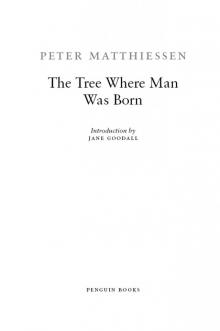 The Tree Where Man Was Born
The Tree Where Man Was Born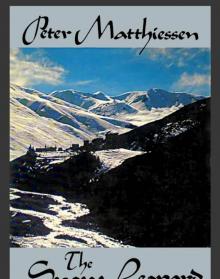 The Snow leopard
The Snow leopard Sand Rivers
Sand Rivers The Cloud Forest
The Cloud Forest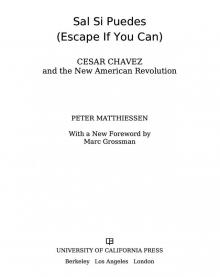 Sal Si Puedes (Escape if You Can)
Sal Si Puedes (Escape if You Can)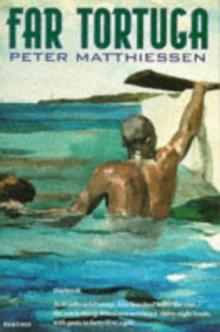 Far Tortuga
Far Tortuga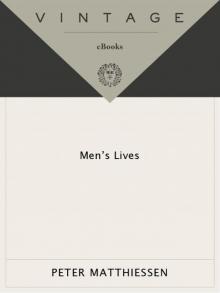 Men's Lives
Men's Lives On the River Styx: And Other Stories
On the River Styx: And Other Stories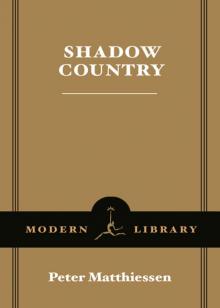 Shadow Country
Shadow Country At Play in the Fields of the Lord
At Play in the Fields of the Lord Lost Man's River
Lost Man's River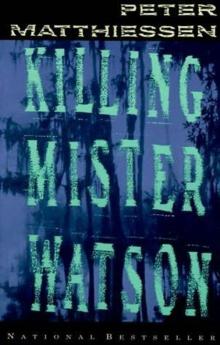 Killing Mister Watson
Killing Mister Watson On the River Styx
On the River Styx